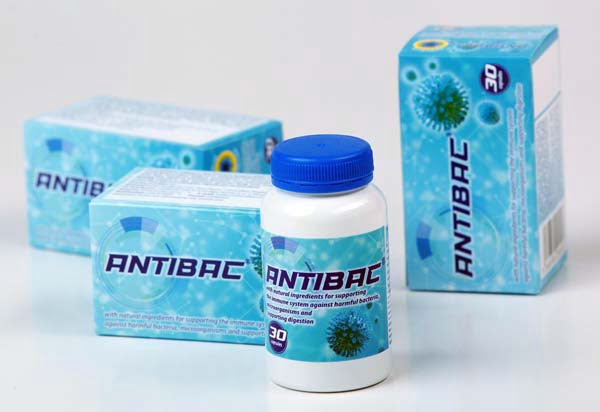Health recommendations for using the AntiBac product


Supporting liver and bile functions and healthy digestion, contributes to the microbiological balance of the intestine
A new era in medical science has dawned with the realization of the critical role of the “forgotten organ,” the gut micro-biota, in health and disease. Some important insights have already been gained about how the microbiota might influence a number of disease processes both within and distant from the gut. Gut-commensal microbiota interactions play a fundamental role in promoting homeostatic functions such as immunomodulation, upregulation of cytoprotective genes, prevention and regulation of apoptosis, and maintenance of barrier function. Read more

The beneficial effects of AntiBac in the alleviating the symptoms and side effects caused by bacterial, fungal etc. infections
An infection is the invasion of an organism's body tissues by disease-causing agents, their multiplication, and the reaction of host tissues to the infectious agents and the toxins they produce. Infections can be caused by a wide range of pathogens, most prominently bacteria and viruses. Epidemiology is the study and analysis of the distribution, patterns and determinants of health and disease conditions in defined populations. Read more

Contribution to the reduction of the effects of bacterial nosocomial infections, particularly on Gram-negative bacteria
A hospital-acquired infection, also known as a nosocomial infection, is an infection that is acquired in a hospital or other health care facility. In the US, the cdc.gov estimated that roughly 1.7 million Healthcare-Associated infections, from all types of microorganisms, including bacteria and fungi combined, cause or contribute to 99,000 deaths each year. In Europe, where hospital surveys have been conducted, the category of gram-negative infections are estimated to account for two-thirds of the 25,000 deaths each year. Many types display antimicrobial resistance, which can complicate treatment. Read more

Supporting the body’s protection against harmful bacteria and microorganisms
Microbiota have been found to be crucial for immunologic, hormonal and metabolic homeostasis of their host. Types of human microbiota include bacteria, archaea, fungi, protists and viruses. The relationship between some gut flora and humans is not merely commensal, but rather a mutualistic relationship. The systemic importance of compounds they produce are like hormones and the gut flora itself appears to function like an endocrine organ, and dysregulation of the gut flora has been correlated with a host of inflammatory and autoimmune conditions. Read more

Supporting the immune system and the body’s natural defences, especially in the upper respiratory tract
The immune system is a network of biological processes that protects an organism from diseases. It detects and responds to a wide variety of pathogens, from viruses to parasitic worms, as well as cancer cells and objects such as wood splinters, distinguishing them from the organism's own healthy tissue. Dysfunction of the immune system can cause autoimmune diseases, inflammatory diseases and cancer. Immunodeficiency occurs when the immune system is less active than normal, resulting in recurring and life-threatening infections. Read more

Mitigating the effects of bacterial superinfections due to a weakened physical condition and a strained immune system caused by viral infections
Pneumonia is a type of chest infection. It affects the tiny air sacs in your lungs, called alveoli. When you have pneumonia, these air sacs get inflamed and fill with fluid. More people get pneumonia in winter. This is because respiratory viral infections that spread easily from person to person, such as flu, are more common in the winter, and these increase your risk of developing pneumonia. Read more

Significant antioxidant effect that contributes to counteracting the shift of the free radical antioxidant balance, which plays a significant role in the development of several chronic diseases
Free radicals have both harmful and beneficial effects in cells. Free radicals alter the structure and function of substances in the body. For example, in high concentrations they can damage proteins and DNA. They can damage cell membranes (the protective covering of cells), cause tissue damage and inflammation, and generally disrupt chemical processes within the body. To prevent this disruption and damage, our bodies naturally make, and acquire from food, molecules that react with free-radicals. These are generally called antioxidants. Read more





